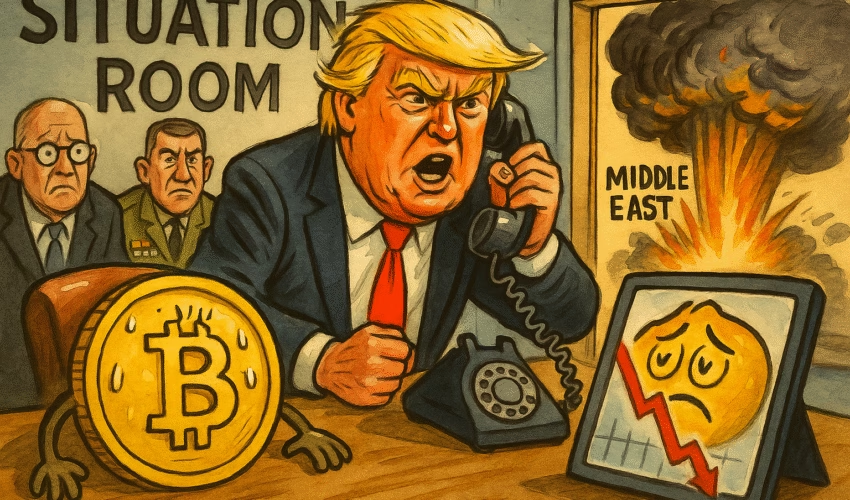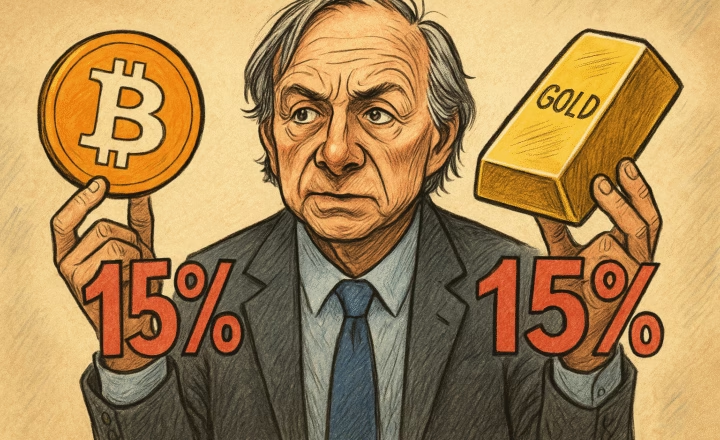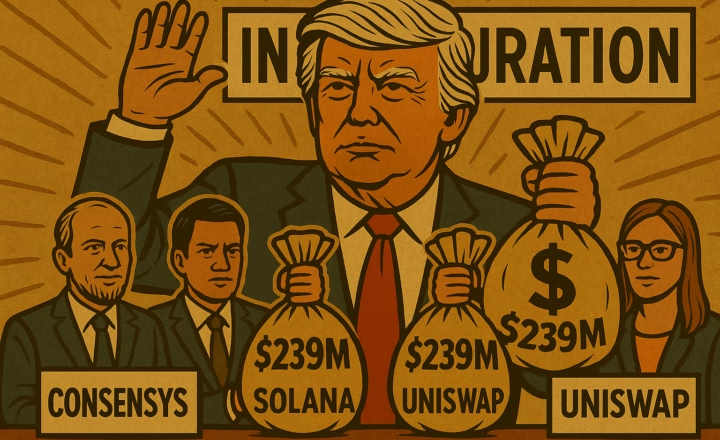Crypto Market Reacts to Rising Geopolitical Tensions and Evacuation Warnings
Bitcoin (BTC) and the broader cryptocurrency market faced a sharp downturn on Monday night after reports surfaced that U.S. President Donald Trump had summoned senior advisers to the White House Situation Room, amid intensifying conflict between Israel and Iran.
Trump’s early departure from the G7 summit in Canada, combined with an alarming post on Truth Social, further fueled investor uncertainty and triggered a wave of sell-offs across digital assets.
Trump Urges Evacuation, Returns Early to Washington
According to Fox News, Trump cut short his attendance at the G7 summit and returned to Washington, where he directed the National Security Council to convene in the Situation Room.
“I have to be back.”
President @realDonaldTrump answers why he’s leaving the G7 Summit early. pic.twitter.com/NGFIInrt58— Fox News (@FoxNews) June 17, 2025
Shortly before the report, Trump posted on Truth Social:
“Everyone should immediately evacuate Tehran!”
White House Press Secretary Karoline Leavitt confirmed Trump’s early return, citing the escalating Israel-Iran conflict as the reason.
“Much was accomplished, but because of what’s going on in the Middle East, President Trump will be leaving tonight after dinner with Heads of State,” Leavitt said, according to CBS News.
“I have to be back early for obvious reasons,” Trump told reporters.
Bitcoin Reacts to Geopolitical Shock
Markets responded swiftly to the developments. Bitcoin, which had reached an intraday high of $108,780, dropped nearly $2,400, falling to $106,421 before a slight recovery.
The 2% dip came within a few hours, highlighting the market’s sensitivity to geopolitical shocks. Bitcoin continues to trade within a range-bound channel established in early May, with support at $100,000 remaining intact.
Altcoins See Deeper Losses
While Bitcoin saw moderate losses, altcoins experienced more severe declines:
-
Ethereum (ETH) fell 4.8%, reaching support at just over $2,500
-
Other high-cap altcoins dropped between 5% and 6%
-
The total crypto market capitalization declined by approximately $80 billion
According to CoinGlass, more than $400 million in leveraged positions were liquidated in the hours following the news.
Evacuations Underway as Tensions Rise
The escalating conflict has prompted foreign governments to urge evacuations from the region:
-
The Chinese Embassy in Israel issued an advisory via WeChat, encouraging its nationals to leave the country through land border crossings:
“The Israeli-Iranian conflict continues to escalate, with civilian facilities damaged and casualties rising.”
-
The Russian Embassy issued a similar directive:
“All Russian citizens who are in Israel should leave the country until the situation normalizes,” Ambassador Anatoly Viktorov said to state media.
These warnings reflect growing international concern over civilian safety and the potential for a broader regional conflict.
Crypto’s Safe-Haven Narrative Tested
The incident has once again put the spotlight on Bitcoin’s role as a “safe-haven” asset. While some analysts have previously likened BTC to digital gold, Monday’s reaction suggests that it still behaves more like a risk-on asset during moments of acute geopolitical uncertainty.
“When panic hits the market, even assets with long-term store-of-value narratives can become part of the sell-off,” one strategist told Cointelegraph.
Macro Context Ahead of Fed Meeting
The latest drop in Bitcoin also comes ahead of the U.S. Federal Reserve’s policy meeting scheduled for later this week. While futures markets overwhelmingly expect no change in interest rates — with a 96.7% probability of the Fed holding rates at 4.25–4.50% — any deviation or unexpected hawkish comments could add further volatility to already jittery markets.
“Between the Fed and geopolitical risk, traders are opting to derisk until clarity returns,” said Eugene Cheung, Chief Commercial Officer at digital asset platform OSL.
Conclusion
Bitcoin’s $2,000 drop and the broader crypto market sell-off reflect how heightened geopolitical tensions — particularly involving major powers — can swiftly shift investor sentiment. As U.S. President Donald Trump returns early from the G7 to oversee national security planning amid Middle East unrest, markets are likely to remain volatile.
While Bitcoin’s long-term narrative as a decentralized hedge remains intact for some, in the short term, it continues to behave in tandem with risk assets, vulnerable to macro shocks and military escalations.
For now, traders and investors are bracing for a potentially volatile week — with eyes on both Washington and Tehran, as well as the Federal Reserve’s rate decision.












